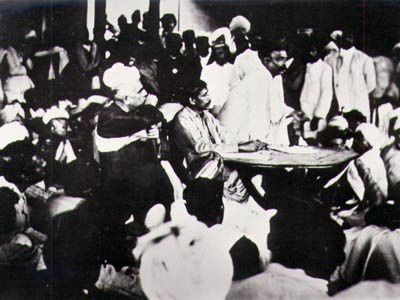
Moderates and Extremists close ranks
The biggest achievement of the 1915 Bombay Session was that the constitution of the Congress was suitably altered so as to admit the delegates from the extremist section. Tilak responded by announcing the willingness of his supporters to re-enter the Congress. As a result the number of delegates rose to 2259 from 866 a year back.

Gandhiji returns
Gandhiji and Kasturba Gandhi set sail for England on July 18, 1914, where they arrived two days after the country had entered World War I. Even during his short stint in England, Gandhiji volunteered to set up an ambulance corps for the war. They returned to India on January 9, 1915, a homecoming that was to change the path of India's history.

World War I
The First World War had begun in Europe and the Congress promised all help in the prosecution of the War. The Congress demanded that the higher ranks of the army should be thrown open to Indians and that military schools and colleges should be established in the country

Satyagraha in South Africa for miners
On October 28, 1913, Gandhiji led a march of 3000 Indian miners from New Castle to Volksrust to protest against the £3 tax which Indian indentured labourers were made to pay. The Satyagraha continued up till January 21, 1914.

Calcutta Session, 1911
The Congress at its Calcutta Session in 1911, congratulated Mahatma Gandhi and the Indian community in Transvaal on the repeal of the South African province's anti-Asiatic legislation

Allahabad Session, 1910
Mohammad Ali Jinnah, who was then a 44-year-old barrister and firmly with the Congress, decried the colonial government's decision to introduce separate electorates for Hindus and Muslims in municipalities and local bodies. He stated that this would disturb the amicable relations between the two communities. It is ironic that Jinnah became the main champion of a separate Muslim state two and a half decades later.

The Surat Split
The Surat Session of the Congress was marred by disturbances. Extremist leaders like Bal Gangadhar Tilak, Lala Lajpat Rai and Bipin Chandra Pal were pushing for resolutions on Swaraj, Boycott and national education while the moderate leaders like Surendranath Banerjea and Gopal Krishna Gokhale were advocating a softer approach. With no meeting ground between the two sections, the Session disintegrated into confusion and eventually had to be suspended.

Congress declares Swaraj as its aim
To counter the increasing influence of the extremists, the moderates invited Dadabhai Naoroji to come from England to preside over the session. However, the vocabulary of the extremists triumphed in a way as Naoroji declared Swaraj as the 'only and chief remedy' In self government lies our hope, strength and greatness, he said.

Gandhi's first Satyagraha
On Sep 1906, Gandhiji led his first Satyagraha in Transvaal, South Africa, protesting against the Asiatic Registration Act. The legislation mandated that every Asian who wished to reside or possess property in South Africa had to register his or her name with the authorities. The punishment for not doing so was deportation without the right to appeal

Fissures emerge at Benares
The divisions between the 'moderates' led by Gopal Krishna Gokhale and Surendranath Banerjea and the 'extremists' led by Bal Gangadhar Tilak came to the fore in this session. While Tilak and Lala Lajpat Rai wanted the Congress to boycott the visit of the Prince of Wales in protest against the Bengal Partition, the moderates opposed any such move.







